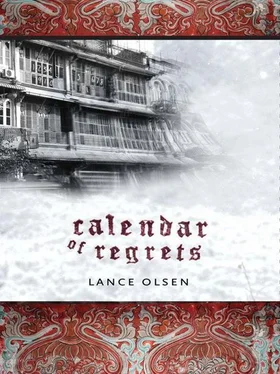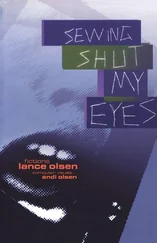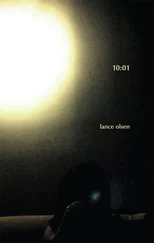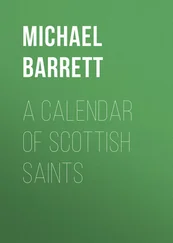She is alone in the bath with Anthea. Her special attendant is dressing her. The other attendants are waiting outside, ready to escort her into another life. She can hear them speaking in low hasty voices through the open window, although she cannot make out what they are going on about. They are such tittle-tattle people. She can hear the deep murmur of hundreds of spectators collected on the promontory overlooking the sea several hundred yards beyond. She finds the air she is breathing far too moist, salty, warm, as the day matures toward noon.
When Anthea slips the veil down in place over Iphigenia's face, Iphigenia whispers: What's it going to be like?
Anthea has been thinking of other things. She holds an ivory clasp between her lips. As far back as Iphigenia can remember, her attendant has never boasted a tooth to her name.
Toothless Anthea comes back to this world. Iphigenia is certain there are others. She watches them every night from her sleep.
You'll see, Anthea says around the clasp.
Iphigenia grins.
But I want to know now. Have you seen him?
Anthea removes the clasp and says: Some things should be a surprise. Some things you shouldn't know about until you know about them.
Iphigenia's grin loosens into a full-blown girlish smile.
Is he handsome as they say?
There you go, Anthea says, fastening the clasp in Iphigenia's hair, hand loitering on the back of the girl's neck. We're ready, sweetheart.
But you're not telling me, Iphigenia says, whine tinting her voice. You've got to, you know.
They have been sitting on facing wooden stools.
Anthea lifts her stiff body, sighs, says: It is time to tell yourself: I shall meet today expecting nothing.
I don't understand.
You don't need to. There's going to be a war.
A war?
Anthea gestures toward the doorway with her long sharp chin that almost touches her long sharp nose.
Far away. Yes. This is what men do, she says. They kill each other. Sack each other's cities. All those ships in the bay? They will sail tomorrow, the gods willing.
Iphigenia stands, tipsy with this surge of newness, steps toward the exit.
Behind her, Anthea adds: Remember. Everything changes, sweetheart. The universe loves to happen.
His muscles. The sheen upon his walnut-brown skin. The way his breath will always smell of mint and lilac and licorice.
Iphigenia is thirteen, but she has petted a baby rhinoceros her father brought back from Cyrene. She has walked beside her siblings through the cobbled streets of sprawling Athens. She has listened to the story of how her father's kingdom was stolen from him, how he took it back by rightful force, how he took his bride — Iphigenia's mother — the same way, killing her first husband, that spineless yokel Tantalus, and then their newborn son. Agamemnon had oil poured over the man on the stage in front of the theater and had him set on fire. Tantalus became a comical living torch, running in circles until he dropped. Agamemnon returned to the palace and lifted Clytemnestra and Tantalus' baby boy out of its crib and gently crushed its skull between his huge palms. The noise was exactly that of biting into an onion, Agamemnon said. It sounded exactly like victory.
No husband is waiting for her: this is the first thing Iphigenia notices as the altar swings into view. A large gray slab of stone on a steep rocky promontory. The crowd surrounding it falling silent as she approaches, heads bowed in awe. Warriors in full armor, but also men, women, and children from the nearby town. Their reverence is as it should be. This is the part Iphigenia always likes best about her appearances, how others offer her their respect and admiration. It makes her feel warm like the sun on your face.
But there is only the granite lozenge, only her father and two priests standing beside it. Iphigenia scans the vicinity for Achilles.
Anthea and the other attendants form an unhurried human wake behind her.
In the distance, the multitude of ships at anchor in the bay, like a multitude of whitecaps. Beyond, the sheer cliffs of Euboea. In her chest, a hand closing, applying slow pressure to her nervous heart.
Sometimes she would not see her mother for weeks on end. Clytemnestra's face would fade in her memory, become incrementally nondescript, a statue's sanded down detail by detail until only the outlines remained.
When Iphigenia had almost forgotten it, Clytemnestra would appear without warning by her bedside in the middle of the night. Sometimes Iphigenia would awake to discover her mother sitting on the floor, knees to chest, sobbing quietly. Sometimes her mother's mouth would be so close to Iphigenia's ear that she could feel its angry wet heat.
There is an ocean , Clytemnestra would whisper, and it will dry up. There are islands, and they will sink. There are men, and the path before them will be spread with their own entrails.
Fast as a hiccup, she would be gone again, leaving Iphigenia lying alone, staring up into blackberry night, her bedroom a cavernous resonance, her soul a frantic tern.
Lie back, daughter, her father tells her as she nears. Take your place. Here.
Where is he, Papa? Iphigenia asks.
The priests, she sees, possess elongated faces and wild cloud-beards. They stand side by side, robed columns, expressionless, hands clasped before them.
Every land has its own ways, says Agamemnon. This is how things are done in Aulis. His ship has anchored. Take your place in preparation for his arrival.
Iphigenia does as she is told. She steps up to the foot of the altar. She turns. The priests help her into position with their pointy fingers.
The breeze falls as motionless as the people gathered around this instant.
Beneath her, the rock warm with sunshine. Iphigenia moves inside herself. She hears her lungs working. She senses the sparkling wine that is her blood coursing through her veins. She feels, as if from very far away, Anthea take her wrists tenderly and lift them over her head.
Iphigenia remains within her body until the tenderness begins to give way to something else — until one of Anthea's assistants who has never touched her before lays a hand upon one ankle, a hand upon the other, tightens her grip.
Iphigenia finds her muscles trying to retract involuntarily.
The assistant bears down.
Anthea leans forward and kisses Iphigenia softly, quickly, on the forehead. Iphigenia opens her eyes and the first tickle of alarm passes through her. Anthea has never kissed her before. Some things are done, and some are not. Yet Iphigenia's father does not move, says nothing. The birds keep circling above her. The waves keep lapping against the shore below.
She lets her father be himself for several seconds, then asks:
Papa?
Agamemnon answers with wordlessness.
Papa? she repeats. What's happening?
Instead of explanation, she hears the priests at her feet begin to chant:
Oh, Artemis, grant us wind, speed, billowing sails. Grant us strength, grant us true aim, grant us swift triumph. Grant us wisdom, luck, hope. Grant us cunning, grant us bounty, grant us—
Close your eyes, Anthea whispers into Iphigenia's ear. Think of Zeno. Think of your beautiful mechanical bird. When you open them next, your husband will be standing in front of you.
But just before Iphigenia does what Anthea asks her to do, she catches sight of the glint in her father's enormous right fist.
Each of us must forgo in his own way , Agamemnon intones. This is called heroism. Each of us must give what he least wishes to give. This is called duty. Through forfeiture, our people hound success. For favorable winds, I do what is demanded of me.
Iphigenia twisting madly, her mouth suddenly stuffed with cloth.
Читать дальше












